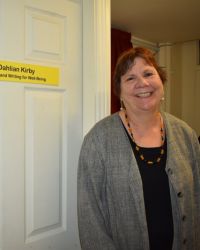Should you see a counsellor when a pet dies?
For most people, a pet is part of the family. So, when the pet becomes ill, it is a worrying time. Then the day dawns that the loving owner dreads: either their beloved animal has died, or possibly worse - they have to make the decision to have it humanely killed by a vet.
For some people, this is sad but easy to move on from. For the rest of us, this is a time of grief. We often feel shocked, and then mourn in a way that seems inconsolable. Many of the feelings we experience are not that dissimilar to mourning a human being we have loved.

But it’s only an animal, isn’t it? And surely you'll get over it soon?
Well, no. We don’t always get over it soon and, as the months pass and you're still grieving your beloved pet, you may ask yourself 'should I see a counsellor?'
Grieving over the loss of a loved one is natural but painful - sometimes excruciatingly so. Not all people who lose a human friend or relative through death see a counsellor, however, some do. They usually do because they are struggling to come to terms with their loss, in fact, they are struggling with life. Losing an animal companion can also be devastating, as the being you saw every day is no longer there.
Whilst society generally understands the mourning of human life, it seems less able to be supportive (generally) of someone who is, for example, bursting into tears three months after their dog has died. With any death comes the reminder that life is short, and if we become distressed we might find our own life begins to lack meaning.
Talking your feelings through with family and friends (preferably ones who love animals and your pet, in particular) is a good way to start to come to terms with your loss. However, this might not be enough. And, if it’s not, it may well be worth seeing a counsellor.
If you have already had counselling and you liked your counsellor, the best idea would be to go back to that counsellor, unless of course they are specialists in one issue and don’t cover bereavement. Otherwise, ask friends or family or search for a counsellor near you that you think would suit your needs.

How does counselling for grief help?
Some people worry that having counselling will make them feel more distressed, that they will be asked to talk about things they don’t feel like talking about. This is not likely to happen - if it does, find a better counsellor.
Your counsellor is there to help you, to support you, and to provide a safe environment in which to express your thoughts and feelings.
Of course, you might well feel distressed, but there will be a professional present to support you through this stage of loss.
One of the many reasons that seeing a counsellor works is that they are used to the pain and grief of others. With all good intentions, our loved ones find our pain difficult to hear and just want us to be OK. Without meaning to, they may be stopping us from moving on with phrases like, “I hate to see you cry”, “I miss her as well, you know”, or “but he died months ago!”
The counsellor will patiently listen, without judgement. Your counsellor won’t make you talk about something you can’t talk about.
Each counsellor works in a slightly different way, so I can’t say here what to expect from your counsellor in terms of approach. Some may just listen, some may give you written exercises to do in the session or between sessions. What they won’t do is judge you. They won’t tell you to stop crying, they won’t tell you it’s just a cat. They will believe you when you say the pet was like a family member or a best friend. They will understand that you are finding it difficult to cope.
However, they will endeavour to help you to cope. The counsellor will be able to help you accept that, yes, that being was precious and that you must keep their memory alive, and that you can do that in a way that is better for your own well-being.
Imagine how good it might be to be able to talk about your beloved pet; tell someone all about their favourite food, their personality. With a counsellor, you may well find yourself laughing at the funny moments, as well as feeling sad about missing your precious companion.
Bereavement is a process, but one that we all do differently. There is no correct way to mourn a loss. A counsellor should be able to support you towards healing, but they won’t ask you to forget. The counsellor doesn’t have to be a specialist in bereavement or even own a pet. Their role is to be a part of the journey of your life, to walk beside you when you need someone to listen, witness and understand.

Find a therapist dealing with Bereavement
All therapists are verified professionals






